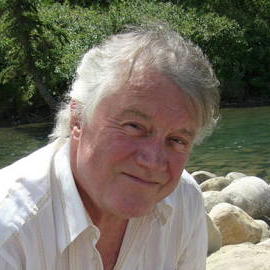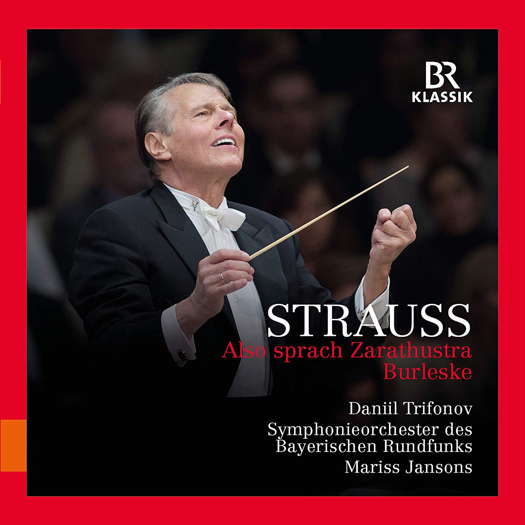- Mode Records
- Humperdinck
- Brilliant Classics
- In-depth Features
- Mahler
- Josquin des Prez
- Rodewald Concert Society
- Amazon River
 VIDEO PODCAST: John Dante Prevedini leads a discussion about Classical Music and Artificial Intelligence, including contributions from George Coulouris, Michael Stephen Brown, April Fredrick, Adrian Rumson and David Rain.
VIDEO PODCAST: John Dante Prevedini leads a discussion about Classical Music and Artificial Intelligence, including contributions from George Coulouris, Michael Stephen Brown, April Fredrick, Adrian Rumson and David Rain.
 SPONSORED: The Many Hats of Allan Rae - A Birthday Greeting, by Endre Anaru.
SPONSORED: The Many Hats of Allan Rae - A Birthday Greeting, by Endre Anaru.
All sponsored features >>

Thus Conducted Mariss Jansons
ONA JARMALAVIČIŪTĖ discovers
a unique listening experience on one of
the Latvian conductor's last recordings, featuring
Daniil Trifonov and the music of Richard Strauss
'... this maverick CD contains contrasting faces of Richard Strauss, Trifonov's virtuoso skills and one of the last memories of Mariss Jansons' conducting.'
This very melodic CD is dedicated to the works of Richard Strauss. It has come from the hands of such musicians as Daniil Trifonov – the most astounding pianist of our age – and the late artistic director of the Bavarian Radio Symphony Orchestra, Latvian conductor Mariss Jansons. The recording's traditional symphonic sound, even in the 21st century, is grippingly profound and impactful with its perfection to detail. The spirit of German composer Richard Strauss was ever-evolving and on this CD two pieces from different ends of his career are contrasted together as an unusual duo for comparison – the sparkling Burlesque for piano and orchestra in D minor (1886) and a complex composition, born a decade later and loosely based on Friedrich Nietzsche's philosophies – Thus spake Zarathustra (1896). Nevertheless, these works are not so complementary, but the performers bring a tasteful unity of sound and expression throughout the CD, marking the growth of Richard Strauss' genius.
The composer grew up under his father's influence, creating traditional genre pieces in classical and romantic spirit, thus clearly avoiding such names as Rchard Wagner and Ferenc Liszt. This all changed when he met his tutor Hans von Bülow and freed himself creatively. At that time his passion for the genre of the symphonic poem was born. In his youth, Richard Strauss was interested in positivism and themes of self-actualization, determination, overcoming and human willpower. Such thoughts at the time were also tackled by philosopher Friedrich Nietzsche and propagated by the character Zarathustra in one of his most famous novels. It came only naturally that Strauss would soon composes a Thus spake Zarathustra himself.
Since it is known that Nietzsche himself strived to compose music and would refer to his novels as 'symphonies', it would have been interesting to know his opinion on Strauss' famous Thus spake Zarathustra. Nietzsche's classic philosophical novel represents the quest to find the meaning of life when confronted by an indifferent, uncaring natural world and humanity's own corporeal, animal existence. The ambition to bring musical expression to philosophical thought seems risky at least. Critics of the time were even teasing Strauss to compose for Immanuel Kant's work Critique of Pure Reason next. On the other hand, it is somewhat comforting to hear that chilling existential questions resembling the familiar in beautiful sounds that follow an ancient tradition, are being controlled by a man, and are not such an unlocked mystery as it is in the case of understanding human existence. The general storylines and ideas from chapters of the novel inspired the poem's structure. Thus is divided structurally into nine sections - Sunrise; Of Those in Backwaters; Of the Great Longing; Of Joys and Passions; The Song of the Grave; Of Science and Learning; The Convalescent; The Dance Song and Song of the Night Wanderer - played with three definite pauses. The distinctive style of Strauss – warm lyricism – is evident throughout these chapters of the novel.
Listen — Richard Strauss: Von der Wissenschaft (Also sprach Zarathustra)
(track 6, 2:07-3:03) © 2020 BRmedia Service GmbH :
After it was composed in the year 1896 it became one of the best-known symphonic poems with its opening theme being without a doubt the most popular piece of music Richard Strauss had ever written, famously used in Stanley Kubrick's 1968 film 2001 - A Space Odyssey.
Listen — Richard Strauss: Einleitung (Also sprach Zarathustra)
(track 1, 0:12-0:33) © 2020 BRmedia Service GmbH :
In this way, Strauss had fulfilled his self-actualization by tackling a heavy task of conveying through music an idea of the human race's religious and scientific development. Throughout the piece, the keys C and B major represent opposite forces of the universe (C major) and humanity (B major). The piece ends with an unresolved B-major chord, famously called an 'unanswered question' and reminding us of all the mysteries of life that we will never find answers on.
Listen — Richard Strauss: Das Nachtwanderlied - Epilog (Also sprach Zarathustra)
(track 9, 3:47-4:46) © 2020 BRmedia Service GmbH :
The other composition also marks Strauss' transition from Brahms to Wagner's aesthetic. Burlesque for piano and orchestra in D minor (1886) at the time was somewhat of a revelation, representing the 'new music' - bitonality, dissonance, chromaticisms, etc. The composition has a dazzling, restless score full of humor and overflowing instrumental imagination. The presence of its soloist, virtuoso Daniil Trifonov, brings new atmosphere to it all. Solo artist, pianist, chamber musician, and composer Trifonov was felt through the piece, bringing focus to every note and yet feeling the purpose of the bigger picture. Mariss Jansons brings the same precise, edgy as well as broad and expressive orchestral colors from Thus Spake Zarathustra into Burlesque. Yet sometimes it felt less fitting for its sparkly orchestration and the sensitive approach of Daniil Trifonov, who has a distinctive soft, fragile sound to his interpretation of Burlesque. His playing is filled with emotional expression and inner stillness at once. It went a bit at odds with the dramatic and all-encompassing orchestral grip. On the other hand, such a combination adds more agitation and interest to the listening experience.
Listen — Richard Strauss: Burlesque
(track 10, 14:19-15:17) © 2020 BRmedia Service GmbH :
From 2004 until last season, the Bavarian Radio Symphony Orchestra was under the direction of the late Mariss Jansons, the world-known conductor and a student of both Hans Swarowsky and Herbert von Karajan. Jansons had successfully created an atmosphere of the highest artistic standards and a close tie with the orchestra members. Therefore the orchestra's musical expression on this recording feels calm, melodic yet focused and intense, sometimes even sharp. Emotionally expressive yet technically detailed with every phrase perfected like a precious souvenir or memory, striking a balance between the technical and musical sides of the recording with ease and confidence. Since his passing last year, Mariss Jansons has been greatly missed by many colleagues, musicians and listeners. This season the Bavarian Radio Symphony Orchestra is looking for a successor as chief conductor, who would carry the on tradition and legacy of the orchestra by building a broad and stylistically diverse repertoire for the people.
In conclusion, this maverick CD contains contrasting faces of Richard Strauss, Trifonov's virtuoso skills and one of the last memories of Mariss Jansons' conducting. All these components make this listening experience unique and thus truly respectable.
Copyright © 30 April 2020
Ona Jarmalavičiūtė,
Vilnius, Lithuania

CD INFORMATION - STRAUSS: ALSO SPRACH ZARATHUSTRA; BURLESKE
FURTHER INFORMATION - RICHARD STRAUSS
FURTHER INFORMATION - MARISS JANSONS
FURTHER REVIEWS OF BR KLASSIK CDS


